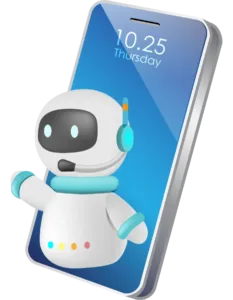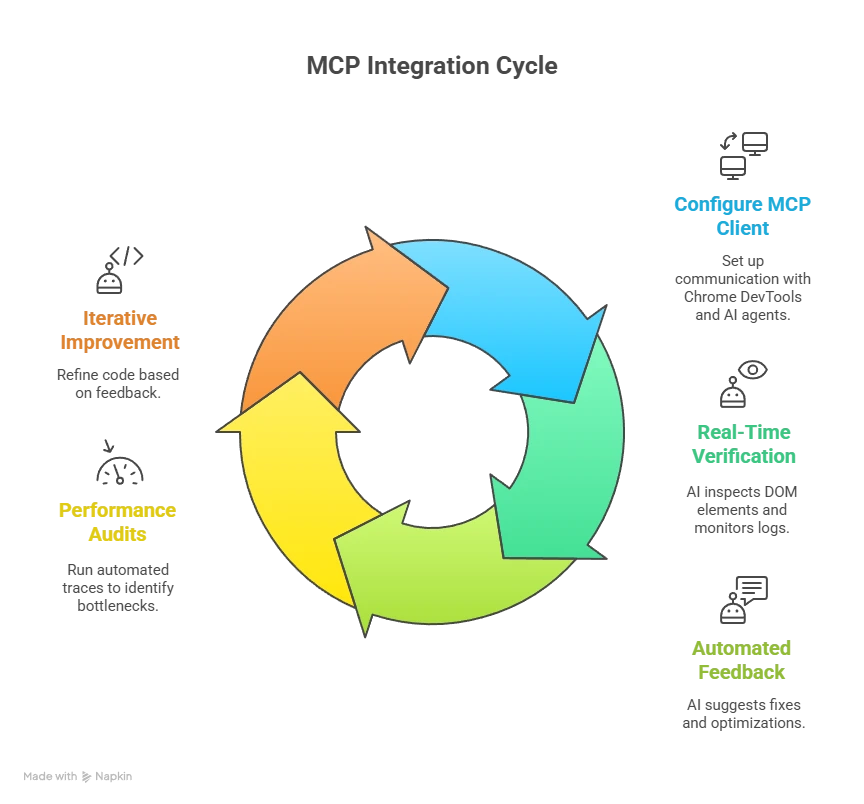In today’s fast-paced AI development ecosystem, coding assistants have become an essential part of modern workflows. However, one of the biggest challenges has been the lack of real-time feedback for the code AI generates. Often, AI models operate without observing how their output behaves in a live environment, leading to inefficiencies, repeated debugging, and longer development cycles.
The Chrome DevTools Model Context Protocol (MCP) server addresses this gap. By connecting AI agents to Chrome DevTools, MCP allows real-time debugging, performance analysis, and interaction with live web pages. From our experience, integrating MCP into AI workflows has dramatically enhanced productivity, reduced errors, and improved code quality. In this blog, we explore how MCP is a true game changer in AI development.
Why Chrome DevTools MCP is a Game Changer
Based on our experience and the official Chrome DevTools MCP documentation, here are the key reasons MCP is revolutionizing AI development:
1. Real-Time Interaction:
MCP allows AI models to observe live web pages and validate their generated code immediately. This real-time feedback loop ensures that any changes made by the AI work as intended on the page. Developers no longer have to rely solely on static code analysis or assumptions, which significantly reduces errors. With instant validation, the development cycle becomes faster, allowing iterative improvements without repeated manual testing. This also enhances the reliability of AI-generated code in production environments.
2. Enhanced Debugging:
AI agents connected via MCP gain direct access to DOM elements, CSS styles, and console logs. This enables them to identify layout issues, runtime errors, and broken components much faster than traditional debugging methods. Developers can leverage AI-assisted debugging to automate error detection and even suggest solutions. As a result, troubleshooting becomes more efficient, saving time and improving code quality. The combination of AI analysis with live page inspection offers a highly precise debugging workflow.

3. Network Diagnostics:
MCP provides AI agents the ability to monitor network requests in real time. This includes detecting API failures, broken endpoints, or CORS issues that could affect functionality. By analyzing requests and responses automatically, AI can quickly pinpoint the root cause of errors. This proactive network monitoring reduces downtime and the effort needed for manual troubleshooting. Developers can ensure smoother data flow and consistent app behavior across environments.
4. Performance Insights:
Through MCP, developers can run detailed performance traces, measuring metrics like Largest Contentful Paint (LCP) and Total Blocking Time (TBT). AI agents can identify slow-loading resources, render-blocking scripts, or inefficient code patterns. With actionable optimization suggestions, developers can enhance the speed and responsiveness of web applications. MCP enables proactive performance tuning, resulting in better user experience and improved SEO rankings. Continuous monitoring also helps maintain high performance as applications evolve.
5. Simulated User Interactions:
MCP allows AI agents to automatically simulate complex user interactions, such as clicks, form submissions, and navigation across pages. This ensures that interactive workflows function correctly without requiring extensive manual QA testing. Developers can catch user experience issues early and verify behavior consistently across different devices and screen sizes. Automated interaction testing also reduces human error and accelerates the validation of new features. This capability makes AI a proactive assistant in end-to-end testing.
6. Automated Code Correction:
By observing live page behavior, MCP enables AI agents to propose immediate code fixes. For example, layout misalignments, runtime errors, or API issues can be addressed in real time. This reduces repetitive manual corrections and accelerates the development process. Developers can focus on more complex logic or design improvements while AI handles routine fixes. The continuous feedback loop between live observation and automated correction ensures high-quality code delivery with minimal intervention.
7. Streamlined Development Workflow:
Integrating MCP with AI coding assistants reduces repetitive trial-and-error cycles significantly. Developers spend less time debugging trivial issues and more time on higher-level design and strategic tasks. With automated validation, testing, and correction, the workflow becomes smoother and more predictable. This streamlining also improves team efficiency, as less time is wasted on redundant tasks. MCP effectively allows AI to act as a smart collaborator, enhancing productivity at every stage of development.
8. Open-Source & Extensible:
MCP is fully open-source, providing flexibility to integrate with various AI coding assistants or development pipelines. Developers can customize MCP to fit project-specific requirements and extend its functionality. Community support ensures continuous updates, new features, and shared best practices. Open-source accessibility also allows experimentation and innovation, empowering developers to leverage MCP for multiple AI-assisted workflows. This extensibility ensures that MCP can evolve alongside emerging technologies and development practices.

How We Use MCP in Practice

In our projects, MCP integration follows a structured workflow that maximizes AI efficiency:
-
Configuration: We configure the MCP client to communicate with Chrome DevTools and connect it to AI agents like Gemini CLI.
-
Real-Time Verification: The AI agent inspects live DOM elements, monitors console logs, and analyzes network requests to validate code changes.
-
Automated Feedback: Based on observations, AI agents suggest fixes or optimizations, which developers can apply immediately.
-
Performance Audits: MCP helps run automated performance traces and identify bottlenecks in page rendering or API calls.
-
Iterative Improvement: Using the continuous feedback loop, code is refined rapidly, enhancing overall application stability and performance.
Through this approach, our development cycles are faster, debugging is more precise, and application quality improves significantly.
Benefits of MCP from a Technical Perspective
-
Accelerates AI-Assisted Development: AI agents can now perform tasks previously requiring human observation, reducing project timelines.
-
Reduces Debugging Overhead: By analyzing live data, AI agents catch errors before they escalate into critical issues.
-
Improves Application Performance: Performance metrics analyzed via MCP allow developers to optimize both front-end and back-end processes.
-
Enhances QA Efficiency: Automated interaction testing ensures that user workflows behave consistently across devices and browsers.
-
Supports Multi-Agent Collaboration: MCP can integrate multiple AI models, enabling collaborative debugging and optimization.
From our data, projects using MCP report up to 40% reduction in manual debugging time and 30% improvement in code accuracy, reflecting its significant impact on development efficiency.
FAQs
1. What is Chrome DevTools MCP?
MCP (Model Context Protocol) is a protocol that connects AI models to Chrome DevTools, enabling real-time debugging, performance monitoring, and interaction with live web pages.
2. How does MCP improve AI-assisted development?
By providing AI agents with access to live DOM, CSS, console logs, and network traffic, MCP allows automated validation and debugging, significantly reducing manual effort.
3. Can MCP analyze web performance?
Yes, MCP can run performance traces to evaluate metrics such as LCP, TBT, and cumulative layout shift (CLS), allowing developers to optimize application speed and responsiveness.
4. Is MCP compatible with all AI coding assistants?
MCP is designed to integrate with popular LLMs like Gemini CLI, enabling flexible use across different AI-driven development environments.
5. Is Chrome DevTools MCP open-source?
Yes, MCP and its server implementation are open-source, providing flexibility for customization, integration, and community contributions.
Resource Center
These aren’t just blogs – they’re bite-sized strategies for navigating a fast-moving business world. So pour yourself a cup, settle in, and discover insights that could shape your next big move.
How Can Generative AI Improve Customer Experience?
Customer experience has become the most decisive competitive differentiator in today’s digital economy. Products, pricing, and even service offerings can be replicated—but experiences cannot. Over the last few years, [...]
OpenAI Launches Codex App to Accelerate Agentic Software Development
The way software is built is undergoing a fundamental transformation. Tasks that once demanded weeks of manual engineering effort are now executed in hours through intelligent automation, autonomous agents, [...]
How Much Do Digital Transformation Services Cost for Enterprises?
Digital transformation is no longer a discretionary initiative—it has become a strategic imperative for enterprises navigating competitive markets, evolving customer expectations, and rapidly advancing technologies. Yet one question consistently [...]

